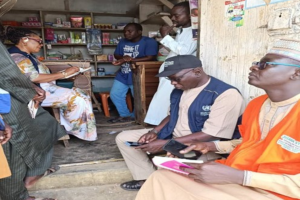Nigeria intensifies surveillance to sustain progress toward polio eradication
Abuja, Nigeria is intensifying its efforts to end all forms of poliovirus by the end of 2025. With technical support from the World Health Organization (WHO) and partners, the Government, through the National Emergency Operations Center (NEOC), has launched rapid surveillance assessments to enhance the capacity to detect suspected cases as rapidly as possible and guide vaccination responses.
These checks strengthen state and community-level systems, close surveillance gaps, and align with the Polio Eradication Roadmap 2022–2026 to sustain progress toward eradication.
Between 23 and 29 August, Jigawa State conducted the first RSA, led by the State Ministry of Health. The review spanned five Local Government Areas (LGAs)—Hadejia, Auyo, Buji, Sule Tankarkar, and Gwaram—and covered 14 health facilities, including Rasheed Shekoni Federal University Teaching Hospital and Federal Medical Center Birnin Kudu. Twenty-four community informants were engaged, and 12 cases of acute flaccid paralysis (AFP) were followed up to validate reporting sensitivity.
State leadership and community engagement
The assessment confirmed Jigawa’s strong coordination and extensive grassroots networks, mapping more than 12,000 Jakadun Lafiya (community health workers), 288 Village Health Workers, 650 Community Health Influencers, Promoters and Services programme (CHIPS) Agents, and 2,880 Volunteer Community Mobilizers as frontline resources for case detection.
Dr Kabir Ibrahim, Permanent Secretary of the State Ministry of Health, noted: “The Rapid Surveillance Assessment has given us an evidence-based picture of our surveillance system. We will use these findings to close gaps and ensure no suspected case goes undetected.”
For local health workers, the exercise strengthened their role in protecting communities. “I have seen children who suddenly lost strength in their legs. Now I know how important it is to report such cases quickly so they can get help,” said Salamatu Abubakar, a Village Health Worker at Danladi PHC, Sule Tankarkar LGA.
Strengths and challenges
While the RSA demonstrated strong structures, it also identified gaps requiring attention, including the need to expand active case searches, strengthen environmental surveillance, and address immunity gaps.
Jigawa State Epidemiologist Ismaila Mamuda explained: “The RSA has identified critical gaps but also provided practical solutions. With these lessons, we are better positioned to detect, report, and respond swiftly to any suspected cases.”
National perspective and roadmap alignment
Nigeria was certified free of wild poliovirus in 2020 but continues to face risks from circulating variant poliovirus type 2 (cVDPV2). Surveillance remains central to the Polio Eradication Roadmap, and WHO is supporting Nigeria to ensure data-driven decisions and rapid vaccination responses.
Dr Namadi Lawal, Technical Lead for Polio Surveillance at the National EOC, emphasized: “These assessments ensure Nigeria’s surveillance remains highly sensitive. The lessons from Jigawa will guide corrective actions and strengthen surveillance in other states.”
At national level, Dr Kofi Boateng, WHO Polio Eradication Programme Cluster Lead in Nigeria, reaffirmed WHO’s support: “WHO is working side by side with the Government of Nigeria to close surveillance gaps and sustain progress. These interventions are expected to improve case detection, guide vaccination responses, and keep Nigeria on track to achieve its eradication goal this year.”
Scaling up nationwide
Building on Jigawa’s example, RSAs are planned for Borno, Katsina, Lagos, Sokoto, and Zamfara states between October and December 2025. By year’s end, the nationwide roll-out will strengthen surveillance capacity, expand outbreak response readiness, and help Nigeria achieve its eradication targets while sustaining Africa’s polio-free status.
This activity was supported by the Global Polio Eradication Initiative (GPEI) partners, including WHO, UNICEF, AFENET, Rotary International, the Bill & Melinda Gates Foundation, and Gavi, the Vaccine Alliance.



